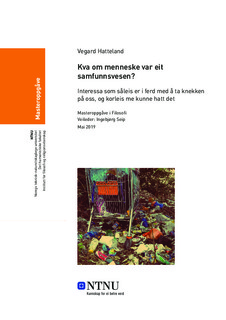| dc.contributor.advisor | Seip, Ingebjørg | |
| dc.contributor.author | Hatteland, Vegard | |
| dc.date.accessioned | 2019-10-16T14:00:15Z | |
| dc.date.available | 2019-10-16T14:00:15Z | |
| dc.date.issued | 2019 | |
| dc.identifier.uri | http://hdl.handle.net/11250/2622609 | |
| dc.description.abstract | Er sosialitetet menneske si mest grunnleggande moralske interesse? I kontekst av vår tids økologiske krise og metaforteljingane sitt fall i førre århundre argumenterer me for at den moderne tid si bestemming av menneske som eit fritt vesen er noko grunnleggande problematisk. Med utgangspunkt i den kantianske tradisjonen spør me om ikkje moderniteten si bestemming av menneske som eit fritt vesen fyrst og fremst er uttrykk for ei feilslått moralsk interesse. I og med si utgreiing for menneske si ideelle tilstand (eines Reiche der Zwecke) verkar Kant å beskriva ein hedonistisk livspraksis. Denne tilstanden skulle dessutan høyra til å bli nådd ved hjelp av ei historisk forankra moralsk oppseding (ausbildung) av arta. Ikkje berre visar metaforteljingane sitt fall at håpet, i Jean-François Lyotard sine ord, strengt tatt er ute for dette prosjektet, er det ikkje dessutan i utgangspunktet litt rart at menneske skulle slita såpass mykje med å verkeleggjera si mest grunnleggande moralske interesse? I denne avhandlinga går me tilbake til Aristoteles for å finna ut om ikkje Aristoteles si beskriving av menneske som eit samfunnsvesen i den moderne tradisjonen har blitt grunnleggande misforstått. Det seias at Aristoteles sin politikk ikkje held all den tid Aristoteles argumenterte for slaveri, men heng ikkje i midletid heile dette argumentet på ei antaking av at menneske skulle ha grunnleggande interesse av å bestemma over seg sjølv, altså av å vera fri? Med utgangspunkt i Aristoteles og Nietzsche går me moderniteten si bestemming i tygla, og forsøker samtidig å finna ut om menneske ikkje eigentleg har sosialitet som si mest grunnleggande moralske interesse. | |
| dc.description.abstract | Is sociality human being’s most fundamental moral interest? In context of our time’s ecological crisis and the previous century’s fall of the meta-narratives, I argue that the modern determination of human beings as free is fundamentally problematic. On basis of the Kantian tradition we ask if not modernity’s determination of human beings as free actually is an expression of a misguided moral interest. His famous notion of humanity’s ideal condition, the «Reiche der Zwecke», seems to us as a hedonistic life practice. This condition was moreover supposed to be reached via a historically rooted moral education (ausbildung) on part of our species. Not only seems the fall of the meta-narratives to tell us that there is no hope left for this project, it moreover seems strange that we should have to struggle this much in the first place, in realizing what was supposed to be our most fundamental moral interest. In this thesis we will go back to Aristotle to see if not his description of human beings as a political animal in modern times has been fundamentally misunderstood. It is said that Aristotle’s politics is fundamentally unjust because he argued for slavery, but isn’t this whole argument itself rooted in the conviction that human beings have a fundamental interest for freedom? On the basis of Aristotle and Nietzsche we examine thoroughly modernity’s fundamental premises and at the same try time to find out if not human beings actually have sociality as our most fundamental moral interest. | |
| dc.language | nno | |
| dc.publisher | NTNU | |
| dc.title | Kva om menneske var eit samfunnsvesen? | |
| dc.type | Master thesis | |
